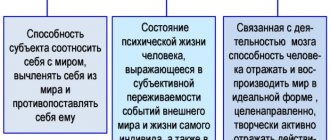The formation of a child’s personality begins from an early age and continues until he grows up, but even here the development of the individual does not end, but “polishing” occurs almost throughout his entire life. But still, an important moment of development is childhood, and many psychologists focus on the preschool period. Therefore, in this article we will mainly talk about the stage before school - what factors influence the development of a preschooler and the conditions that contribute to harmonious formation, as well as what other stages of personal development exist in childhood.
Formation and development of a child’s personality
The process of personality formation includes an understanding of the society in which the child lives, the formation of the inner world with its emotions, motives and norms of behavior, volitional qualities, priorities and their correct placement, as well as awareness of one’s own self-esteem and self-knowledge (“Who am I? What am I worth?” "What can I do? What do I want and can do?").
This is why the preschool period is singled out, because during it the conscious process of understanding and accepting oneself, as well as one’s position in society, begins. Development of personal characteristics and norms of behavior that will create the foundation (under favorable conditions) for the full development of the individual.
Phases of personal development
Modern personal theories of development indicate that, regardless of the line of personal development, this process is determined by psychological patterns. Their presence does not depend on the age period or the specifics of the group in which the individual is located at a particular moment. These psychological patterns are called phases of personality development. Among them are the following:
- The first phase of development is adaptation. During it, a person must master those techniques and means of activity that are used by other members of the social group. Simple skills and language are mastered, speech is formed, which becomes a prerequisite for further development. Mandatory interaction with the social environment is necessary, during which speech develops. The process of mastering elements of activity is based on the experience of losing one’s individual characteristics. In reality, there is a continuation of human actions in other people and their activities. The individual shares his personal potential.
- The second phase of personal development is individualization. Its basis is the emergence of a conflict between a person’s need to be similar to the people around him and the desire for maximum personalization. A person contrasts himself with others, distinguishes his personality. During the process of passing through this phase, the individual is in search of means and ways to resolve this contradiction.
- The third phase is integration. In the process of passing it, a person learns to control his behavior based on submission to elders and interaction with others. In the case when the contradiction drags on for a long time, ways of resolving it are not found by man, disintegration occurs, that is, a problem in development. The formation and development of personality is carried out through exclusion from the social group. With actual isolation, negative qualities are consolidated in the character.
In some cases, the community, during the passage of the personality of the last stage, adapts to the needs of a particular person. He becomes a leader capable of influencing, determining the direction of development and functions of a social group.
The process of passing through the phases is strictly sequential. It is impossible to skip one of them in the process of normal personal development. When psychological patterns are violated, negative characteristics are formed. The reversibility of the process depends on the degree of disturbances, including in the development of speech; all this is individual.
Stages of child personality development
Each period of development of a little child is truly important for a future happy life, so it is necessary to know the nuances of each stage.
- From birth to one year old. Important skills of “trust” in the world and the desire to learn new things are laid. If parents give the baby much-needed affection, trust, care, and encouragement, then the baby will continue to grow open to communication, cheerful and purposeful.
- From one to 3 years (it is also called the early period). There is a rapid development of psychomotor skills. The baby begins to walk and run, independently perform a number of actions that the adult shows. Tries to make his own decisions. The main thing is not to “scare him off” at this stage - adults often do not have enough patience for the baby to complete some action on his own, for example, putting on his pants or putting on his shoes, they often begin to help and hurry, and sometimes shout and shame. It is important at this age to encourage your child even for small successes, and try not to notice failures. By example, show how to behave, clearly explain how to act in different situations, form and persistently consolidate useful skills. Do not interfere with the baby’s reasonable independence, give him the opportunity to make simple decisions (for example, what socks to wear, what toy to take for a walk, what game to play with him now, etc.).
- From 3 to 6 (7) years (or preschool period). There is an active learning of oneself and the world around him, an adult is bombarded with a thousand “why” questions, the baby begins to perform more complex actions and communicate with more people than at an early stage, he actively fantasizes and shows his creative inclinations. The adult’s task is to encourage his desire to learn new things and creative aspirations, to stop him and shame him less for his restlessness and sometimes importunity. If this stage goes well, you will grow up to be a purposeful, responsive, sociable and positive person.
- From 6 (7) to 10 years (early school stage). During this period, the child begins to learn and acquire valuable knowledge and experience, assimilates the rules and norms of behavior in the team. It is very important for him to satisfy the growing thirst for knowledge and approval and understanding from his elders. Only under such conditions will he feel like a happy person with a desire to learn new things and achieve results.
- From 10 to 15 years (middle school period). There is an active formation of his own “I”, his needs and value priorities, awareness of his place in society, the approval of his peers is extremely important for him, the child thinks about the future - acquiring a profession, family values. Often at this stage the child rebels, tries to oppose himself to the adults and do things his own way. The task of the elders is to react tactfully to this, not to succumb to provocations, to try to peacefully resolve situations and find the “keys” to mutual understanding.
- From 15 to 19 years old (senior school stage). During this period, there is often hesitation in order not to make a mistake with the choice of life priorities. If a child sees a happy family nearby with trusting communication, he develops relationships with peers, he is successful in school, then he takes his last important step towards growing up, avoiding crises. It is important that during this period the elders do not insist, but suggest ways to solve situations, justifying them, leaving the right of final choice to the children. This way they feel needed and in demand, are not afraid to make decisions and grow up to be successful people with strong willful qualities.
Demographic transition is a consequence of uneven development
Now let us pay attention to the unevenness and non-linearity of human development, which S.P. Kapitsa and other authors speak about. He identifies four main stages, where the first, anthropogenesis, began approximately 4.5 million years ago. Then the Stone Age began 1.6 million years ago, pre- or including the Neolithic. The third stage - historical time, began approximately with the Neolithic, including the ancient world, the Middle Ages, modern and recent history. Duration is about 10 thousand years. And finally, the demographic transition. Began around 1960. Approximate completion date: 2050
That is, this is the same division as in human life. Only on the contrary, if these periods lengthen in humans, then in humanity they shorten. The uterine, prenatal stage is anthropogenesis, then childhood - adolescence to the ancient world and the emergence of religions, maturity - from the Ancient world to the present day, and the demographic transition
Please note that the speed of development of man and humanity is multidirectional. Inevitably, one can predict the moment when they will become approximately equal. This is exactly how I calculated this moment in the 80s. I considered the duration of the transition to be approximately one active human life, that is, about 50 years, beginning approximately in the 50s, 60s of the last century.
We briefly answered two questions that we asked at the beginning - what theory and what calculations are we talking about. We briefly showed the connection between the development of humanity and the development of each individual person.
Now let’s try to formulate the main transitional boundaries of the stages of human development in their connection with the stages of development of a particular person.
Factors in the development of a child's personality
They are usually divided into hereditary and external. It is customary to classify as hereditary as the state and functioning of the nervous system, as well as the whole organism, a predisposition to certain mental illnesses, the functioning of the nervous system, a certain type of behavior, etc.
Acquired characteristics include the emergence of personal characteristics of an individual, depending on his environment - family, peers, teachers and educators, other people in society.
Moreover, if we practically cannot influence heredity (or only slightly), then the social factor is completely within our power. And according to various modern psychologists, it accounts for 70-80% of the successful formation of a person’s personal characteristics. That is why it is so important to know what conditions are necessary for the full development of personality.
Human development as a subject of scientific research
Today, there are many theories about the origin and development of the human race. Science insists that modern representatives of all nationalities descended from monkeys. From the primate stage, humans have advanced to the modern level of development. This happened because at first there was a need to arrange their lives so that they had something to eat, something to keep warm, where to live - these were goals that people managed to achieve. Over time, they realized that this was not enough, they could come up with something better, and if this succeeded, life would become even easier and more comfortable.
Only after the creation of certain living conditions that met the needs of people did they begin to think about relationships and spiritual development. Such progress did not take hundreds or even thousands of years. Finding yourself, the ability to create relationships in society, do your job correctly, express your thoughts - this is what created the people whom everyone is used to seeing every day. And the words: “Labor made a man out of a monkey” have found their application in the 21st century. Modern man is not going to stop there, because moving forward is what gives the incentive to live, work, and enjoy every new day.
Conditions for the development of a child’s personality in the preschool period
For the successful formation of children, the following conditions are necessary:
- A happy family. Harmonious relationships in the family and the correct behavior of parents in relation to each other, to the baby himself, and to society form in the child confidence, trust, and copying of behavior patterns and adaptation mechanisms in communication. He grows up cheerful and active.
- Communication with peers. At this age, communication with other children is extremely important for children; they love playing together, where they learn important communication skills, try to defend their positions and are faced with the need to “give in” if they want to be played with. It is not always possible to reach an agreement at this age, but this is an experience necessary for the future. If a child does not go to kindergarten, then parents must find an alternative and provide communication for their child.
- Satisfying children's curiosity. Kindergartens, sections, answers to endless questions from parents, etc. - must provide for the child’s need to understand the world. The main thing is to find a “golden mean”; both overload with activities at this age and failure to satisfy his needs lead to poor results.
- Development of creative inclinations. During this period, the baby actively fantasizes and invents, begins to notice what others do not see, comes up with original solutions, creates and tries to creatively realize (in sculpting, drawing, modeling, etc.) extraordinary images. An adult should not scold the child for his fantasies, but should encourage him. The gaming club https://mrbitcasinoplay.com/ invites guests to play for cryptocurrency. Take time and “create” with your child. If you notice a tendency towards any kind of creativity, then it is good to send your child to a specialized section. The formation of such skills will definitely have a beneficial effect on the development of children, will help them become non-standard individuals with original approaches to decision making - and this is often an integral attribute of success.
- The right to one's own self. If elders give children the right to choose, entrust them with feasible tasks and rely on him, do not criticize him over trifles, and “see” him as a person, then he grows up as a responsible, caring, self-confident person.
In order for children to grow up as cheerful and successful people, with developed strong-willed qualities and a strong position in life, who are admired and loved by others, it is necessary to observe the conditions for harmonious development, devote your time to the kids and do not skimp on praise and affection!
The meaning of preschool age
If the development of personality at an early age was aimed at the emotional perception of the environment, then in preschool age the situation changes. This period is characterized by a more active perception of information. There is an expansion of social contacts, the appearance of the first team in the child’s life - a group in a preschool institution. Parents still play a decisive role. They form a polarity of attitude towards the world around us (positive-negative).
In preschool age, work activity acquires special value. Despite the fact that the child does a lot of things with mistakes, he needs to be taught simple work skills. In this case, the simple rules of life should be explained: good-bad, right-wrong. Communication allows a child not only to expand his vocabulary, but also to learn universal human values. Children must understand the need to respect elders and the rules of politeness. The presence of both parents in the family contributes to the formation of role identity.









